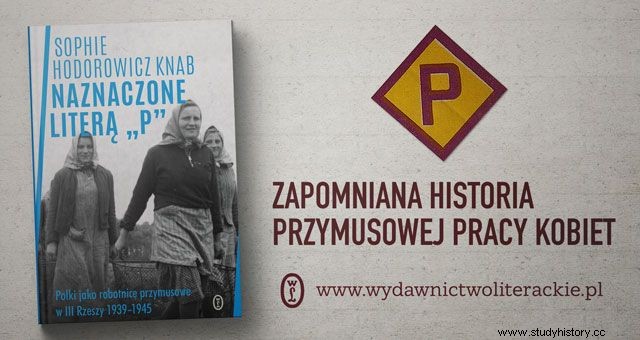During the war, the Germans desperately needed hands to work. They found them in occupied Poland, from where they wanted to transport up to a million workers. However, the task turned out to be more difficult than they thought:Poles used all their cleverness to defend themselves against leaving. Which of their methods were the most effective?
"We're going to work in Germany!", "Come with us!" - shouted from the posters laughing groups of young Polish women and Poles. According to Nazi propaganda, thanks to German farmers who offered jobs and provided decent living conditions, unemployment and poverty were a thing of the past. This is evidenced by the photos of satisfied employees who eat a lavish dinner in clean white shirts. And the saved money is sent to the mother in Poland ...
This, of course, is the vision of the Polish society by the occupant. Leaflets, posters, propaganda films, and even special "recruiting" groups that traveled around the country enumerated the benefits of working in the Reich. These arguments were reinforced by the distribution of alcohol and cigarettes. Despite these efforts, Poles guessed what the life of a forced laborer really looked like. Hunger and working beyond strength.
"Coercive measures may now be used"
No wonder that German propaganda met with resistance. Official announcements were torn off and warnings were stuck in their place: "You want to die of consumption, go to Germany to work!" . On the buildings where departures were recruited, there was an inscription:"Funeral services".
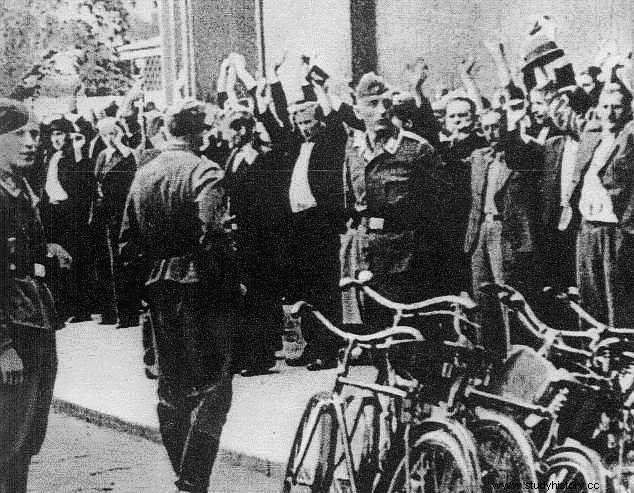
Unable to find volunteers, the Germans began the forced recruitment of workers. One of the methods was street round-ups.
The resistance of the Poles was so great that despite the involvement in the recruitment process in the General Government of a group of about 4,000 German civil servants, the results were mediocre. According to Sophie Hodorowicz Knab in the book "Marked with the letter P. Polish women as forced laborers in the Third Reich 1939-1945", Governor General Hans Frank in March 1940 complained to his advisers:"Berlin insists that a million agricultural workers be sent to the Reich (... ) and 81477 has hit so far. " A few months later, the German dignitary already admitted openly that "due to the insufficient number of volunteers to work in the German Reich, coercive measures can now be used to obtain labor."
The entire process was supervised by representatives of the local administration. They made sure that the top-down contingent of forced laborers was sent to Germany. In the event of failure to appear when summoned, fines were imposed, and property confiscated (for example, croissants from the farm). Occasionally, food allowances, imprisonment or repressions against family members were ordered.
How did designated persons protect themselves against deportation? Often times, the response to a call was simply to run away, for example into the surrounding forests. 21-year-old Waleria P. from Szalowa was hiding with her sister in the mountains for a long time. Eventually, however, she began to hesitate. “More and more letters come to me, because if not, they will take daddy to arrest and it may be bad with him. There is no way out, she decided. Tired of being kept hidden, she decided she couldn't sacrifice her own father. She left for Germany on April 24, 1941.
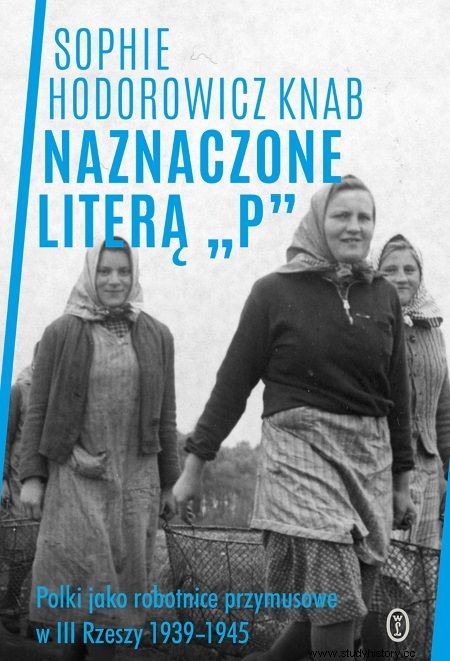
You can find out more about the fate of Polish women deported to Germany during World War II by reading the book by Sophie Hodorowicz Knab entitled “Marked by the letter P” (Wydawnictwo Literackie, 2018).
In turn, the Bojka family from Zakopane had to face night searches and numerous threats, when one of their three daughters was appointed for forced departure. The girls managed to hide quite successfully, even in winter, until one of them, Aniela, succumbed to her mother's persuasion and stayed at home on one particularly snowy night. Despite the turmoil and frost, the gendarmes came to their farm. The eighteen-year-old girl hid in the shed, but it was hard for those moments, full of fear for her own life and her mother's health. Finally she capitulated and was taken to Germany in 1942.
Dress-ups, dismissals, bribes…
The life of thirteen-year-old Zofia Kłopocka is no less dramatic. This time it was not her who was selected for the job, but her sister who was five years older. The girls' parents counted on the fact that the verification commission recruited only healthy and strong workers. They came up with the idea to send little and little Zosia to the verification committee to replace the adult Irena. The latter was very proud to be given such a responsible and adult role.
So she appeared when summoned, but no one paid any attention to her delicate appearance, and she was added to the group of women. The last memory of that day is the mother who first "smiled, but somehow very strange" , and then she couldn't hide her tears anymore. In formed formation, the whole group went to the railway station. The words of the transported child are quoted in the book "Marked with the letter P" by Sophie Hodorowicz Knab:
Desperate families were tramping along the sidewalk next to us, brutally chased away by the Germans. My mother threw a bag of sweets towards me on the road. She did not prepare anything to eat, she was convinced until the end that I would be fired.
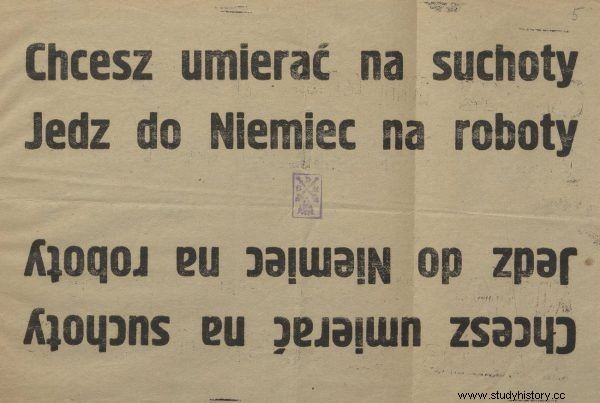
"If you want to die of consumption, go to Germany to work." WWII flyer.
After some time, several effective ways to avoid forced departure were discovered. Counterfeit sick leave or a bribe worked best. For example, the head of one of the villages in the Lublin region saved the inhabitants in exchange for ... a dozen liters of vodka.
Cunning and imagination were sure to come in handy. Mrs. Alicja Strojnowska from Legionowo admits that she was saved from work in the Reich by, among other things, simulating an infectious disease of the conjunctiva. Before the examination, rubbed tobacco under her eyelids . Her eyes, red and watery profusely, aroused the suspicion of trachoma. The second time she appeared before the commission with a severe palpitations, due to the previously used "roosters", pre-war painkillers.
Opportunities to avoid deportation were also provided by forced x-rays of the lungs. At that time, a patient who actually had tuberculosis was substituted, and the healthy candidate avoided leaving. Ways have also been developed to create the appearance of a respiratory disease. Ignacy Saramak recalls that his father, before visiting the doctor, smoked extensively his own-made cigarettes, twisted from dried cherry leaves. The result was a severe cough and a rattle in the chest like in severe asthma.
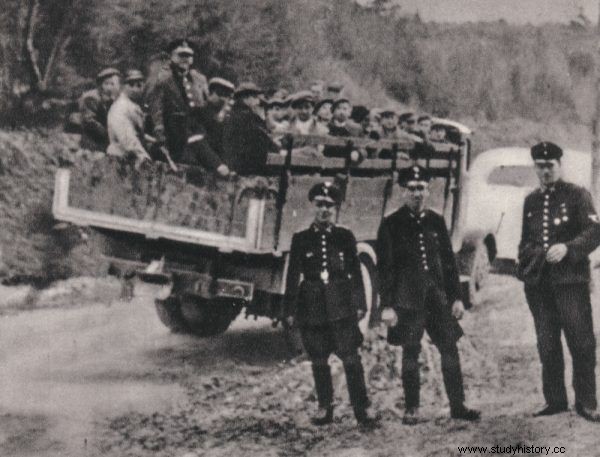
Ronicy from the Krakow voivodeship prepared for deportation to forced labor.
A million "chosen by fate"
In August 1942, over 800,000 "volunteers" still left Poland. The authorities of Thuringia, however, asked Hans Frank for another 140,000. In order to meet the demands placed on him, the governor decided to involve the police. The nightmare of street round-ups began. Ludwik Landau, an economist cooperating with the underground, mentions one of them, whose size spread over the whole of Warsaw:
There were manhunts in the streets, in trams, (...) at all stations and on all trains, in front of churches. (…) There was no age rule for the workplace, even old people were taken, even with all possible certificates.
It was getting harder and harder to avoid deportation. However, there was always the last option:whoever had an affluent wallet could substitute a paid "volunteer" in his place. There are mentions of daredevils who, two or three times, reported to work for someone, only to escape from the transport or simulate an illness on the spot, after their arrival in the Reich. It required a great deal of bravado. As Zofia Kłopocka recounts:
I only knew that if there was such an insistence all the time, there was no dream of escaping. A gendarme in a yellow uniform was sitting in the wagon I was driving. (...) When I was looking at the passing area, I suddenly felt a strong tug on my hand and some gibberish. It was the gendarme who pointed out that one should not look out the window. Rifle shots were heard from time to time. This is how the escapes of the brave few ended.
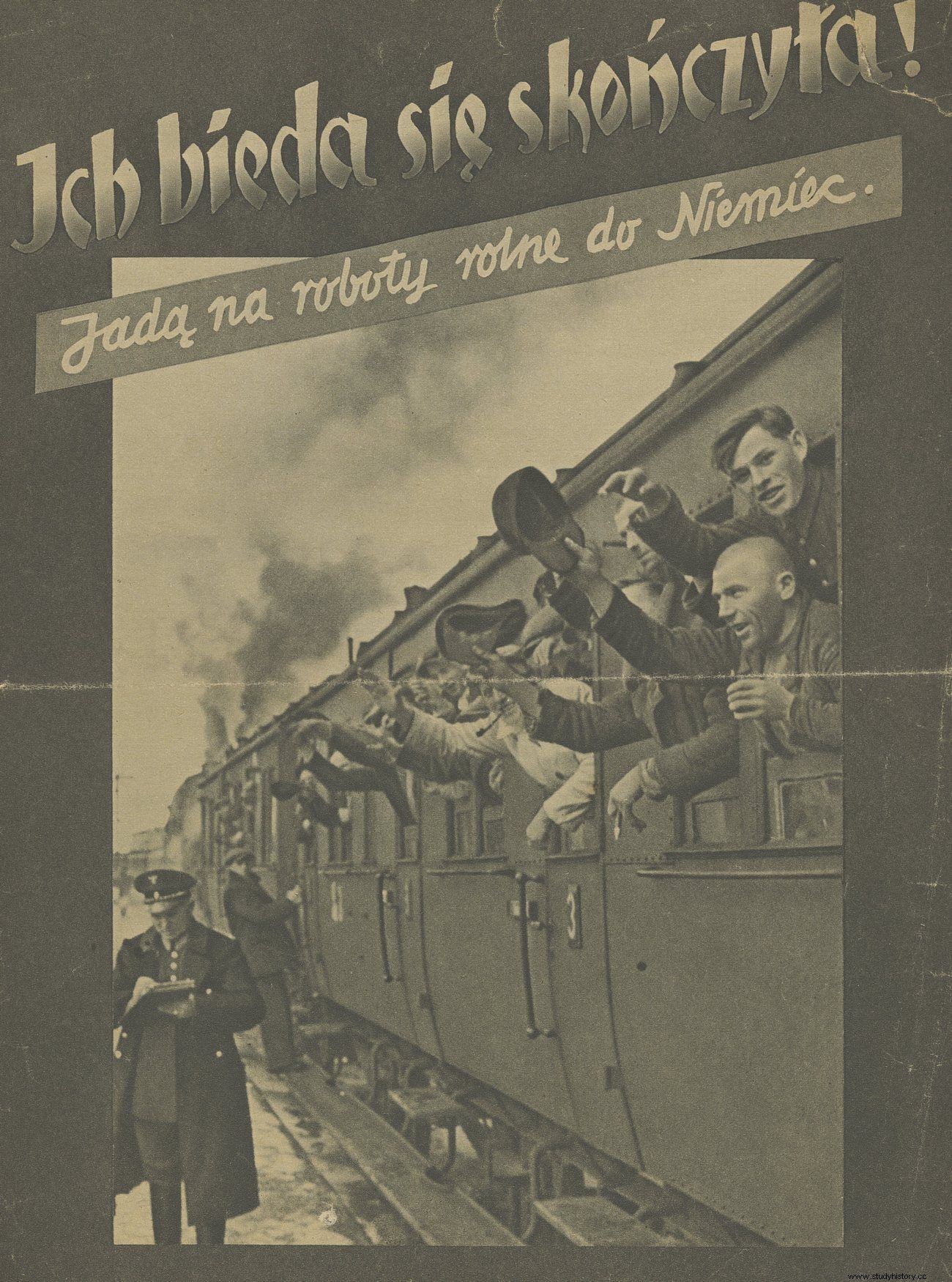
Another poster encouraging people to go to work during the occupation.
In desperate attempts to avoid the deportation of Poles, it actively supported the underground. In 1943, several successful actions took place to help fellow citizens. In Mińsk Mazowiecki, files with the register of people assigned to work in the Reich were burned. In Warsaw, on the other hand, barracks were destroyed, where the Nazis planned to detain residents detained in round-ups.
To this day, it is difficult to determine exactly how many people were deported to work in the Reich. We only know that the Germans have achieved their minimum goal. On March 13, 1943, Hans Frank personally bade farewell to his coveted millionth employee, departing from the Main Railway Station in Krakow. In a pompous speech he thanked the "chosen one" and declared that he would give him a golden watch.
Buy the book at a discount on empik.com
